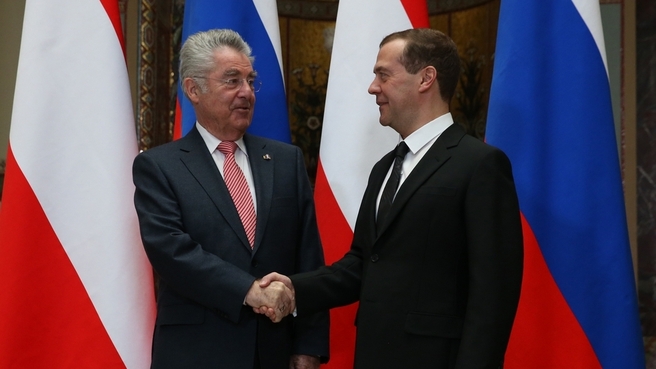Meeting participants discussed, among other things, issues of Russian-Austrian cooperation in trade, the economy and investment.
Transcript of the beginning of the meeting:
Dmitry Medvedev: Mr President, I heartily welcome you. I’m pleased that we have this opportunity to meet.
I’d like to say right away that interaction between our countries is of a very constructive and friendly nature and is based on mutual respect and our mutual consideration of the interests of each other’s states and people. Naturally, we seek to address political, foreign economic and bilateral cooperation issues.
In February, we had a meeting with Vice Chancellor [Reinhold] Mitterlehner who came to attend a session of the intergovernmental commission.
Taking advantage of this opportunity, I’d like to say that we count on developing interaction with Austria on a broad array of issues, especially considering that at present relations between Russia and the European Union are indeed far from ideal. We remember far better days. However, as people who take an optimistic view of the future, we believe that sooner or later this streak will also come to an end because the present course is also far from correct. We all should think about the future: we need to develop economic collaboration and, naturally, hold political consultations – the people of Russia, all EU member states and, of course, Austria have a stake in this.
A significant part of politicians understand this and we appreciate it. Among other things, we appreciate the position that you have followed all these years as the Federal President of Austria, an office that you hold to date.
We have a variety of projects in which our governments participate. We meet on a regular basis. It’s a good thing (I’ll say this again) that an intergovernmental commission meeting has taken place because it has been three years since its last session. No good can come from such a long break. The lack of contact means a decline in trade links and a reduction of collaboration in the investment sphere.
Last year, our trade turnover fell by a quarter compared to 2014. Who stands to gain from this? No one, I think – neither Austrian nor Russian business. Of course, this also has to do with the situation on the raw materials market and restrictions currently in place.
Our opinion is that we should move forward. I hope that your visit will contribute to this. Again, welcome to Moscow.
Heinz Fischer (via interpreter): Thank you very much. The Austrian delegation and I personally looked forward to this meeting and these talks with you and we were confident about its favourable outcome. We entirely share your motto: “We should look above all into the future.” We should not complain about various developments in recent years, although it is impossible to forget them completely. Nevertheless, we should look into the future and work on the numerous challenges we are facing.
As Vice Chancellor Mitterlehner told me, he was very pleased with his recent visit to Russia. It was not so easy to organise it, but eventually it took place because goodwill goes a very long way. I believe the course for developing our relations has been set correctly.
We also regret the fact that the bilateral trade turnover, both export and import, declined last year, in our estimate, by almost a quarter, to 4.3 billion euros. Nevertheless, we are working to restore it to the previous level. We know that Russia is the second biggest investor in Austria, while Austrian investors have a stake in Russia, with many Austrian companies maintaining economic ties with Russia. If I’m not mistaken, about 550 Austrian firms have representative offices in Russia, which is a serious figure.
Taking advantage of this opportunity, I’d like to and I should touch on the following issue. Many entrepreneurs tell us about their successful and problem-free operations here. Some, however, say there are certain problems and difficulties. Perhaps you know about the situation that the EVN company has found itself in. It has signed a very big contract with the Moscow city authorities for the construction of purification facilities, worth several hundred million euros. However, when the city mayor was replaced the project was blocked. In this connection, the EVN management told our economy minister, other government members and me personally, that it is expecting losses between 200 million and 300 million euros. This problem needs to be addressed. I do not think that we will be able to resolve it right at this table, but it is important that we should be prepared for talks on the issue. We will transfer to your aides a number of documents spelling out the gist of the problem. In this way, we will save time.
Another problem I learned about only yesterday morning concerns the Mondi company, a pulp and paper manufacturer. To this end, the company has until now been generating a large amount of electricity on its own. Some of it was used to manufacture pulp while the rest of it was sold. However, recently the situation changed so that the company now has to transfer all of the generated electricity, which it partially utilised for its own needs, to Russian clients and then buy it back at higher prices for manufacturing purposes. The company management is seriously concerned by this and it would be wonderful if upon our return to Vienna we could announce that we have raised this issue in talks and were heeded and that efforts will be taken to rectify the situation.
The successful development of economic ties requires good transport links, with air service playing a prime role here. In this context, Austrian Airlines has a number of requests that I know about it seems since our previous talks. We brought up this issue at the time. It concerns Russia overflight rights, in particular over Siberia, and the corresponding charges.
<…>













